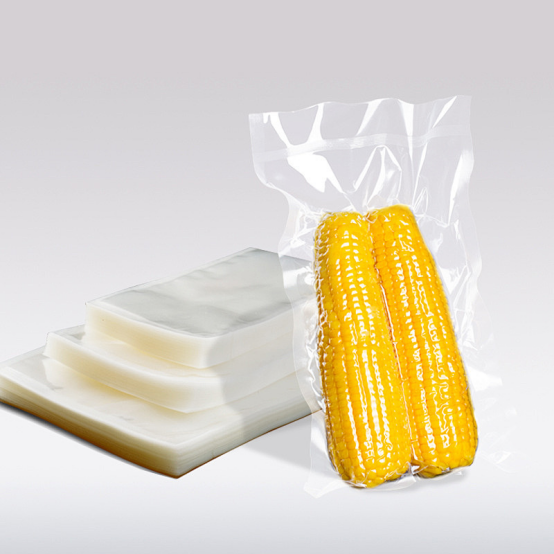Is Vacuum Packaging Bag Suitable for Packaging All Types of Food?
2025-07-30
Vacuum packaging bags are available everywhere at the local supermarket. They maintain freshness of meat, nuts crisp texture, and cheese from going rotten. They slow down spoilage of food by removing air and hence extending its shelf life. But does it mean they're safe for any type of food? The answer is no. Vacuum packaging works fine for most foods, but there are foods that will spoil or even become toxic if sealed in a vacuum bag. Let's take a look at which foods are suitable for vacuum packaging and which ones aren't.
Foods Suitable for Vacuum Packaging
Dry Goods
Dry goods like nuts, rice, pasta, and dried fruit are a good fit for vacuum packing. They will stay crispy without air and won't absorb moisture from the air. Almonds in a vacuum package pack, for example, will stay crispy for months, whereas almonds in an open package will become soft in a few weeks. These foods don't have much water content and less risk of bacterial growth, so vacuum packaging bags are a good choice.
Meat and Fish
Raw and cooked meats, fish, and poultry are also vacuum-packed. Removing air prevents oxygen from damaging the meat and also slows down the growth of bacteria, which need oxygen to develop. A vacuum-sealed steak can be stored in the fridge for 2-3 weeks, while an average bagged steak will last only 3-5 days. Supermarkets and butchers keep these products in vacuum bags for this purpose.
Hard Cheeses
Hard cheeses like Cheddar, Parmesan, or Gouda is an ideal fit for vacuum packaging. Sealed packaging prevents them from drying out and slows down mold growth. They are a low-moisture item and a hard texture, so they would not become slimy or taste horrible once sealed. Vacuum-packaged hard cheese can stay fresh for months in the refrigerator.

Foods Not Suitable for Vacuum Packaging
Fresh Fruits and Vegetables
Most fresh produce, such as apples, lettuce, or carrots, don't fare well in vacuum packing bag. They are breathing foods that absorb oxygen and emit carbon dioxide. Sealing them in a vacuum bag traps the gas, and the bag puffs out. Eventually, the gas will cause softening in fruit and vegetables. Vacuum-packed lettuce, for example, will wilt faster because it does not get the air it would otherwise breathe. Loosely woven plastic bags or mesh bags are more appropriate for these products.
Soft Cheeses and Deli Meats
Soft cheeses (such as Brie or mozzarella) and deli meats (such as ham or salami) are not suitable for vacuum packaging. Their high moisture and fat content creates an ideal environment for harmful bacteria like Clostridium botulinum, which don't require oxygen. Without air, these bacteria multiply rapidly, rendering the food unsafe. Even if the food appears to be fine, it may contain toxins. It's safer to store them in plain containers with some air in them.
Fried or Oily Foods
Fried foods like potato chips, fried chicken, or samosas are not the best candidates for vacuum packaging. Grease tends to soften the plastic bag, causing it to leak or rip. Additionally, the vacuum seal's pressure can collapse the crunchy texture, rendering it soft and soggy. Vacuum-packed potato chips lose their crispiness, affecting their taste.
Special Cases: Vacuum Packaging Possibilities for "Tricky" Foods
Some seemingly unsuitable foods can be vacuum-packed after some pre-processing. Pre-blanching vegetables (such as broccoli or green beans) makes them incapable of breathing after being briefly boiled. Cooled and vacuum-sealed, they will keep in the freezer for as long as one year, longer than if stored in regular bags. Similarly, some berries (such as strawberries) can be frozen before vacuum packaging so they will be kept firm. The secret here is to alter the state of food (freezing or cooking) into something that is more appropriate for a vacuum.
Tips for Using Vacuum Packaging Bags Correctly
For best results, don't overfill the bag, leaving some headroom at the top to ensure a secure seal. With moist foods like meat, pat them dry first; water can ruin the seal. If you're not sure that a particular food will hold up, listen to its shelf life: foods vacuum-sealed in the fridge will still need to be consumed before foods which have been frozen. Also, do not forget to stamp the bag with the date so you can remember the expiration date.
Choose Wancai's Vacuum Packaging Solutions
At FreshSeal Packaging, we specialize in vacuum packaging solutions for various kinds of food. We check each vacuum packaging bag for performance and safety to be able to guide homeowners and businesses in choosing the right packaging. Whether you need to store meat, dry goods, or pre-processed vegetables, we have the perfect product for you. We also provide custom service for your special requirements.
Vacuum packaging bags suit most foods but aren't the solution to every issue. They keep dry products, meats, and hard cheese fresh and clean, and will also be good for some processed vegetables and fruits. However, using them can spoil fresh vegetables and fruits, soft cheeses, and fried foods. The trick is to choose a packing method based on the nature of the food, which may require pre-treatment. Having a knowledge of the foods suitable for vacuum packaging can make your food remain fresh for a longer time and prevent you from wastage. Wancai is a vacuum packaging bag manufacturer with a seasoned pre-sales and after-sales team at your service. We look forward to hearing from you.






